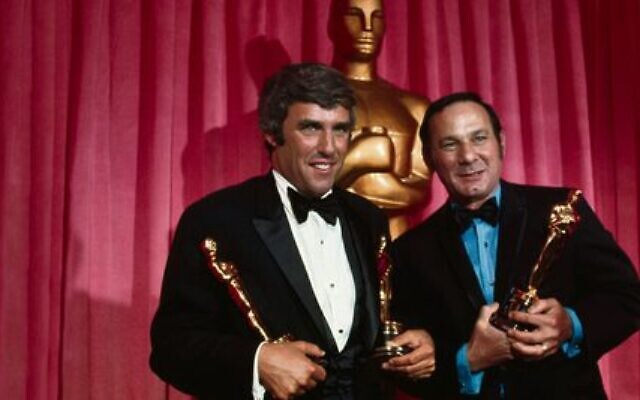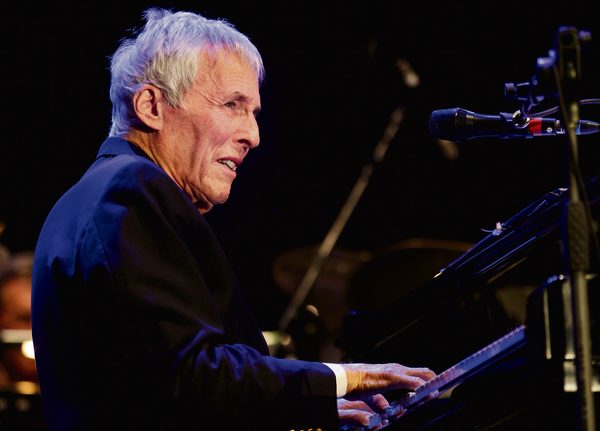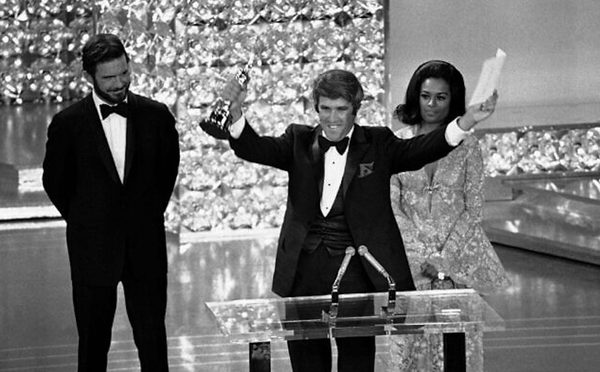A bounty of ballads: remembering Burt
With hundreds of hits under his songwriting belt, Burt Bacharach is known for romantic, melancholic ballads that blurred the lines between jazz and pop.

Songwriter Burt Bacharach, and his long-time lyricist Hal David, rose to fame while working in the Brill Building – a midtown Manhattan mecca for music publishing that housed a slew of Jewish songwriters, including the teams of Carole King and Gerry Goffin and Barry Mann and Cynthia Weil.
But unlike their peers, who wrote for the burgeoning teen market, their songs were marked by a certain elegance and romance that drew more on the Great American Songbook and Broadway than rock’n’roll.
 Bacharach performs in Milan, 2011. Photo: AP Photo/Luca Bruno via Times of Israel
Bacharach performs in Milan, 2011. Photo: AP Photo/Luca Bruno via Times of Israel
Together, they turned out a string of hits in the 1960s and ’70s, including Raindrops Keep Fallin’ on my Head, and a host of songs that made Dionne Warwick a megastar, such as Walk on By, Do You Know the Way to San Jose and I Say a Little Prayer.
Bacharach collaborated with a constellation of stars during his decades-long career, from Aretha Franklin to Dusty Springfield and Tom Jones. He toured with Marlene Dietrich and worked with the White Stripes, Elvis Costello, Adele and even Dr Dre.
A legendary Jewish composer, songwriter and pianist, Bacharach – who died last week of natural causes at his home – was known for romantic, melancholic ballads that blurred the lines between jazz and pop.
He earned a flurry of accolades: three Oscars including for the score of Butch Cassidy and the Sundance Kid, an Emmy, eight Grammy awards including a lifetime achievement prize, two Golden Globes and induction into the Songwriters Hall of Fame.
The list of hits is long; he penned nearly 50 Top-100 hits and nine songs that went to number one on the charts.
One of his most memorable hits, originally co-written with Carole Bayer Sager, who was one of his four wives, along with actress Angie Dickinson, was That’s What Friends are For. The power ballad was then sung by Warwick, and performed by her alongside Elton John, Stevie Wonder and Gladys Knight for a fundraiser to combat the AIDS epidemic.
 Bacharach accepts the Oscar for Best Original Score for Butch Cassidy and the Sundance Kid at the Academy Awards in Los Angeles on April 7, 1970. Photo: AP Photo via Times of Israel
Bacharach accepts the Oscar for Best Original Score for Butch Cassidy and the Sundance Kid at the Academy Awards in Los Angeles on April 7, 1970. Photo: AP Photo via Times of Israel
There’s no denying that Bacharach had a massive influence on many musicians including a lot of the music we listen to today. His songs have a huge cross-generational appeal.
He was a brilliant musician, defying the “natural order” of melodies and instead focusing on off rhythms, broken phrases, and asymmetrical music. His songs commented on relationships, rather than what other musicians at the time were focusing on – political, social and cultural upheavals.
The singers who would perform his songs were diverse, meaning that Bacharach’s music spoke to many people from many different walks of life. Indeed, it continues to do so. Bacharach himself has acknowledged this, saying, “Never be ashamed to write a melody that people remember.”
The songs were so well-written, they could fluidly move between genres. For example, the White Stripes transformed I Just Don’t Know What to do With Myself into a guitar-heavy rock song and Isaac Hayes gave Walk On By a funky overhaul.
Bacharach remained busy right up until the end, with the COVID-19 pandemic the one thing that stopped him from touring.
Prior to the pandemic, he would travel the world, performing his songs and collaborating with elite symphony orchestras.
Demonstrating his longevity and cross-generational fan base, Bacharach sang at the Glastonbury festival in Britain in 2015 at age 87, serenading the crowd with an hour-long set of hits.
The crowd bathed “in the romantic, rose-tinted glow of the easy listening king”, reported The Guardian, adding that pop queen Adele was among those watching in admiration.
Tributes have poured in from around the world and from across the showbiz spectrum – everyone from KISS front man Paul Stanley to Beach Boys co-founder Brian Wilson offered condolences and praise for his signature optimism and effortless orchestrations.
“A titan of beautiful and effortless song,” Smashing Pumpkins’ Billy Corgan wrote on Twitter. Oasis singer Noel Gallagher took to Instagram to pay tribute to Bacharach, writing, “RIP Maestro. It was a pleasure to have known you.”
“Burt Bacharach was as sweet as his songs. He left us with a long legacy of music we will never forget. RIP xo B,” Barbra Streisand shared on Twitter alongside a picture of the two legends.
For Elvis Costello, it was a heartbreaking day. Bacharach’s death was announced mere hours prior to Costello taking to the stage for the first performance of a 10-night residency in New York.
While Costello’s set list was meant to feature music he wrote prior to 1977, he chose to deviate from the plan.
“It’s been a tough day – I can’t deny,” he told the audience.
“A really great man left us yesterday. And when somebody reached a great age, people say well, it was a good ending.
“Yeah, it’s never time to say goodbye to somebody if you love them. I’m not ashamed to say I did love this man for everything he gave, Mr. Burt Bacharach.”
For many, Bacharach’s music fell into the easy listening genre. But ask the artists who worked with him, and they’ll likely tell you his music was anything but “easy”.
The melodies were lush, the chords were beautifully stacked, and the time signatures were constantly changing.
And as for the emotion that many of his songs evoked … anything but easy.
With Times of Israel and JTA

comments